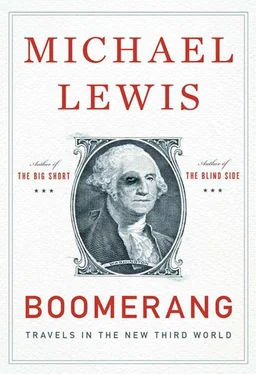IT WAS HORRIBLY unfair: a public resource—all the fish in the Icelandic sea—was simply turned over to a handful of lucky Icelanders. Overnight, Iceland had its first billionaires, and they were all fishermen. But as social policy it was ingenious: in a single stroke the fish became a source of real, sustainable wealth rather than shaky sustenance. Fewer people were spending less effort catching more or less precisely the right number of fish to maximize the long-term value of Iceland’s fishing grounds. The new wealth transformed Iceland—and turned it from the backwater it had been for 1,100 years to the place that spawned Björk. If Iceland has become famous for its musicians it’s because Icelanders now have time to play music, and much else. Iceland’s youth are paid to study abroad, for instance, and encouraged to cultivate themselves in all sorts of interesting ways. Since its fishing policy transformed Iceland, the place has become, in effect, a machine for turning cod into PhDs.
But this, of course, creates a new problem: people with PhDs don’t want to fish for a living. They need something else to do.
And that something is probably not working in the industry that exploits Iceland’s other main natural resource: energy. The waterfalls and boiling lava generate vast amounts of cheap power, but, unlike oil, it cannot be profitably exported. Iceland’s power is trapped in Iceland, and if there is something poetic about the idea of trapped power, there is also something prosaic in how the Icelanders have come to terms with the problem. They asked themselves: What can we do that other people will pay money for that requires huge amounts of power? The answer was: smelt aluminum.
Notice that no one asked, What might Icelanders want to do? Or even: What might Icelanders be especially suited to do? No one thought that Icelanders might have some natural gift for smelting aluminum, and, if anything, the opposite proved true. Alcoa, the biggest aluminum company in the country, encountered two problems peculiar to Iceland when, in 2004, it set about erecting its giant smelting plant. The first was the so-called hidden people—or, to put it more plainly, elves—in whom some large number of Icelanders, steeped long and thoroughly in their rich folkloric culture, sincerely believe. Before Alcoa could build its smelter it had to defer to a government expert to scour the enclosed plant site and certify that no elves were on or under it. It was a delicate corporate situation, an Alcoa spokesman told me, because they had to pay hard cash to declare the site elf-free, but, as he put it, “we couldn’t as a company be in a position of acknowledging the existence of hidden people.” The other, more serious problem was the Icelandic male: he took more safety risks than aluminum workers in other nations did. “In manufacturing,” says the Alcoa spokesman, “you want people who follow the rules and fall in line. You don’t want them to be heroes. You don’t want them to try to fix something it’s not their job to fix, because they might blow up the place.” The Icelandic male had a propensity to try to fix something it wasn’t his job to fix.
Back away from the Icelandic economy and you can’t help but notice something really strange about it: the people have cultivated themselves to the point where they are unsuited for the work available to them. All these exquisitely schooled, sophisticated people, each and every one of whom feels special, are presented with two mainly horrible ways to earn a living: trawler fishing and aluminum smelting. There are, of course, a few jobs in Iceland that any refined, educated person might like to do. Certifying the nonexistence of elves, for instance. (“This will take at least six months—it can be very tricky.”) But not nearly so many as the place needs, given its talent for turning cod into PhDs. At the dawn of the twenty-first century, Icelanders were still waiting for some task more suited to their filigreed minds to turn up inside their economy so they might do it.
Enter investment banking.
FOR THE FIFTH time in as many days I note a slight tension at any table where Icelandic men and Icelandic women are both present. The male exhibits the global male tendency not to talk to the females—or, rather, not to include them in the conversation—unless there is some obvious sexual motive. But that’s not the problem, exactly. Watching Icelandic men and women together is like watching toddlers. They don’t play together but in parallel; they overlap even less organically than men and women in other developed countries, which is really saying something. It isn’t that the women are oppressed, exactly. On paper, by historical global standards, they have it about as good as women anywhere: good public health care, high participation in the workforce, equal rights. What Icelandic women appear to lack—at least to a tourist who has watched them for all of ten days—is a genuine connection to Icelandic men. The Independence Party is mostly male; the Social Democrats, mostly female. (On February 1, 2009, when the reviled Geir Haarde finally stepped aside, he was replaced by Johanna Sigurdardottir, a Social Democrat, and Iceland got not just a female prime minister but the modern world’s first openly gay head of state—she is married to another woman.) Everyone knows everyone else, but when I ask Icelanders for leads, the men always refer me to other men, and the women to other women. It was a man, for instance, who suggested I speak to Stefan Alfsson.
LEAN AND HUNGRY-LOOKING, wearing genuine rather than designer stubble, Alfsson still looks more like a trawler captain than a financier. He went to sea at sixteen and, in the off-season, to school to study fishing. He was made captain of an Icelandic fishing trawler at the shockingly young age of twenty-three and was regarded, I learned from other men, as something of a fishing prodigy—which is to say he had a gift for catching his quota of cod and haddock in the least amount of time. And yet, in January 2005, at thirty, he up and quit fishing to join the currency-trading department of Landsbanki. He speculated in the financial markets for nearly two years, until the great bloodbath of October 2008, when he was sacked, along with every other Icelander who called himself a “trader.” His job, he says, was to sell people, mainly his fellow fishermen, on what he took to be a can’t-miss speculation: borrow yen at 3 percent, use them to buy Icelandic kronur, and then invest those kronur at 16 percent. “I think it is easier to take someone in the fishing industry and teach him about currency trading,” he says, “than to take someone from the banking industry and teach them how to fish.”
He then explained why fishing wasn’t as simple as I thought. It’s risky, for a start, especially as practiced by the Icelandic male. “You don’t want to have some sissy boys on your crew,” he says, especially as Icelandic captains are famously manic in their fishing styles. “I had a crew of Russians once,” he says, “and it wasn’t that they were lazy, but the Russians are always at the same pace.” When a storm struck, the Russians would stop fishing, because it was too dangerous. “The Icelanders would fish in all conditions,” says Stefan, “fish until it is impossible to fish. They like to take the risks. If you go overboard, the probabilities are not in your favor. I’m thirty-three, and I already have two friends who have died at sea.”
It took years of training for him to become a captain, and even then it happened only by a stroke of luck. When he was twenty-three and a first mate, the captain of his fishing boat quit. The boat owner went looking for a replacement and found an older fellow, retired, who was something of an Icelandic fishing legend, the wonderfully named Snorri Snorrasson. “I took two trips with this guy,” Stefan says. “I have never in my life slept so little, because I was so eager to learn. I slept two or three hours a night because I was sitting beside him, talking to him. I gave him all the respect in the world—it’s difficult to describe all he taught me. The reach of the trawler. The most efficient angle of the net. How do you act on the sea. If you have a bad day, what do you do? If you’re fishing at this depth, what do you do? If it’s not working, do you move in depth or space? In the end it’s just so much feel. In this time I learned infinitely more than I learned in school. Because how do you learn to fish in school?”
Читать дальше












